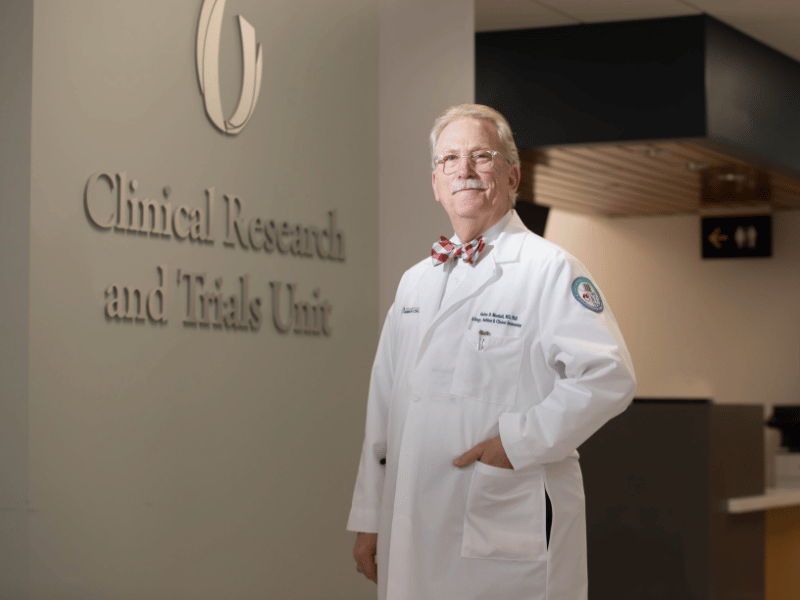The Marshall plan: A stronger partnership between community, academic allergists is new ACAAI president’s goal

Dr. Gailen Marshall is known as an allergist who’s allergic to the status quo, an immunologist who’s susceptible to the call of leadership.
Those qualities have served him well throughout his career, most recently propelling him to the top of a national medical organization with more than 6,000 members.
On Sunday, Marshall, the R. Faser Triplett Sr. MD Chair in Allergy and Immunology at the University of Mississippi Medical Center, was installed as president of the American College of Allergy, Asthma and Immunology at its Annual Scientific Meeting in Anaheim, California.
He succeeds Dr. Kathleen May, professor of pediatrics and allergy-immunology director at Augusta Medical School in Georgia, who shares his vision for the ACAAI: to improve patient care by building a stronger partnership between allergists practicing in the community and their counterparts in academia, such as those at UMMC.
“I am humbled and honored by this opportunity,” Marshall said. “There are plenty of other people who are more or just as capable of leading the ACAAI, but I would like to think I will contribute something of lasting value to the organization.”
Marshall, a physician-scientist, is counting on that, in part, because of his background in bringing research results to the clinic – a “bench to bedside” progression meant to directly benefit the patient.
He will be working with, among others, president-elect Dr. James Tracy of Omaha, Nebraska, during his one-year term that is part of an ongoing commitment that began two years ago when Marshall was elected vice-president, then president-elect, of ACAAI. In 2009, the college awarded him the ACAAI Distinguished Service award and recognized him as a Distinguished Fellow of the College.
Over the years, he has filled leadership positions for other national organizations, including the American Academy of Allergy, Asthma and Immunology; Center for Scientific Review in the National Institutes of Health; and NASA. In 2019, he was elected president of the Southern Society for Clinical Investigation for a one-year term.

“Dr. Marshall has had a tremendous impact in the field of allergy and immunology. He is a true triple threat and leader in the clinical, education and research missions in allergy and immunology and beyond,” said Dr. Michael Hall, professor and chair of the Department of Medicine.
“Dr. Marshall has always been an excellent representative for UMMC and Mississippi on a national level and this new role highlights the important contributions he has made in the field over many years of service. We are very proud to have him as a colleague.”
As he leads the ACAAI, Marshall hopes to forge a working relationship among community allergists and those in academia by:
- Getting allergists in the community more involved in education – teaching students, residents and fellows.
- Enabling community allergists interested in scholarship and research by setting aside ACAAI money for grants that will fund a partnership between the two groups of allergists. The plan is to provide as many as two grants, at $100,000 apiece, for research focused on an allergy/immunology-related interest, such as finding which treatments work best for certain groups of patients in community settings.
“The community allergist is often likely to have more patient diversity than the academic allergist, and the academic allergist may often have more research experience,” Marshall said.
“The academic allergist often cares for patients who may have more complex, challenging diseases and those who have fewer means to pay for therapies – those on Medicare or Medicaid, for instance.
“As practicing allergist-immunologists in the community and academia, we learn from each other and the end result is building a strong partnership going forward.”
Marshall earned both a PhD in immunology and his medical degree at the University of Texas Medical Branch in Galveston. He did internal medicine training at the University of Iowa and completed his residency, chief residency and allergy-immunology fellowship at the University of Tennessee at Memphis.
“I’m bilingual,” said Marshall, referring to his facility for speaking two “languages” – those of the researcher and the clinician.
Marshall, who joined the Medical Center in 2004, has collected a number of honors since then, among them: Inaugural Recipient of the 2015 Mentor of the Year Award from the Southern Section for Clinical Investigation; 2018 Top Allergist/Immunologist from the International Association of HealthCare Professionals, The Leading Physicians of the World; 2020 COVID Hero Investigator from UMMC; and 2021 COVID Physician Hero Award from the Mississippi State Medical Association.
He is also a professor of medicine, professor of population health sciences, professor of pediatrics and professor of pathology, vice chair for research in the Department of Medicine, chief of the Laboratory of Behavioral Immunology Research and executive director of the Mississippi Clinical Research and Trials Center.
Recently, he became director of the newly-formed Division of Clinical Immunology in the Department of Medicine, which will have the sections of Allergy/Immunology and Rheumatology.
Beyond the clinic and the lab, he also excels as a teacher and mentor, said Dr. Jessica Perkins, associate professor of pediatrics-allergy at UMMC.

“Dr. Marshall is just such a good example of the type of allergist I would like to be and I’m very proud that I was able to learn from him,” said Perkins, who is also director of the Allergy-Immunology Training Program.
“He’s charismatic, personable and relatable. He’s a good listener and a good sounding board. He is willing to work down in the trenches as well; he leads by example and is always actively learning.”
He is also well-suited to lead the ACAAI, Perkins said. “I believe he will create a bridge between the allergists in academia and those in the community, that he will help bring cohesiveness and help us realize how much we need each other and how much we rely on each other.
“I look forward to that, and I know this is important to him.”

